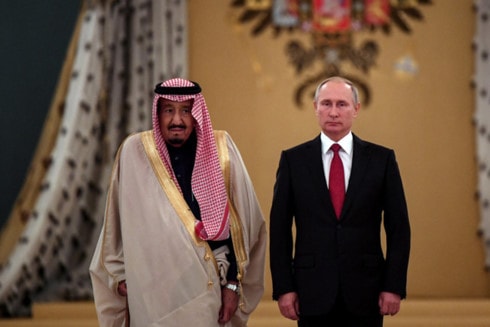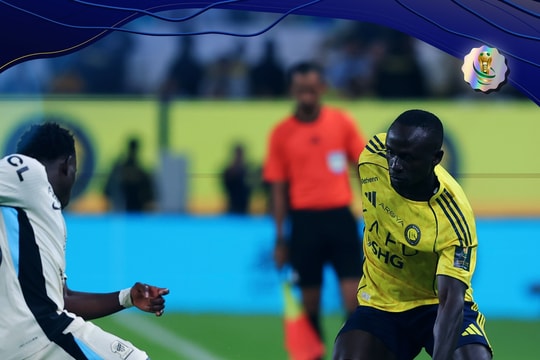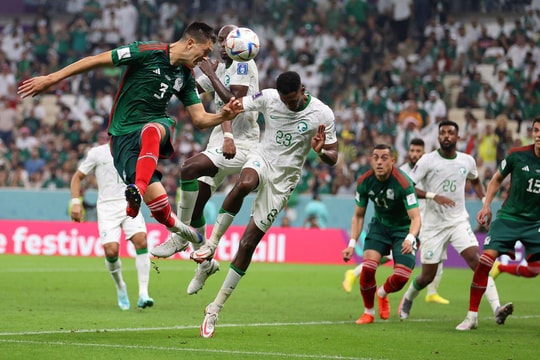Is Russia planning to replace the US in the Middle East?
Russia is winning in Syria, has good relations with Iran, Iraq and Turkey. The King of Saudi Arabia just visited Moscow. Does Russia want to replace the US in the region?
At the opening of a recent meeting with Saudi Arabia’s King Salman, Russian President Vladimir Putin reminded the Saudi leader that the Soviet Union was the first country to recognize the Arab kingdom in 1926. Yet in the decades since, Saudi Arabia has become one of Moscow’s toughest rivals in the region.
 |
| Saudi Arabia's King Salman (left) and Russian President Putin attend a ceremony in Moscow on October 5. Photo: Reuters. |
However, times have changed and King Salman has become the first Saudi king to visit Moscow. Not only that, this visit is also expected to strongly promote Russia-Saudi Arabia cooperation on an unprecedented scale.
From confrontation to cooperation
There have been accusations from the West that President Putin is trying to revive Soviet international ambitions. In fact, Russia’s current policies in many regions go further than Soviet policy ever did. The Middle East is the most dramatic example.
In the past, the Soviet Union and Israel were at times on the brink of direct military conflict. Iran, both under the Shah and after the Islamic Revolution, complicated relations with its northern neighbor. Turkey was a prominent NATO member. Saudi Arabia was eager to develop a cooperative relationship with the United States even when Britain was still the dominant Western power in the Middle East.
Today, King Salman became the last of the four leaders to visit Russia to meet with Putin and discuss bilateral cooperation. However, despite coming later, Saudi Arabia could still quickly catch up with other Middle Eastern countries in cooperation with Russia.
This new rapprochement between Saudi Arabia and Russia may come as a surprise. The two countries have a lot of disagreements. Not only do they compete with each other in the global energy market, they also support different sides in the Syrian civil war. Just last year, Saudi Arabia was so concerned about Russia’s support for Syrian President al-Assad that it made it difficult to start talks on oil price management.
This year, things have changed rapidly. Syrian President al-Assad’s forces have won victories, cooperation between Russia and the OPEC oil cartel has increased, and the Saudi king has visited Moscow.
Same motif as Tho
However, this change is not entirely new. Previously, Russia-Türkiye relations had also become surprisingly warm after a long period of tension since the Turkish air force shot down a Russian fighter jet in 2015. Today, Russia-Turkey relations have never been deeper.
In the case of Saudi-Russian relations, it appears that King Salman intervened to prevent further escalation. That intervention is not without reason. Despite their differences, the two countries do not have such serious issues that they would face off to the death. For its part, Moscow has never declared Saudi Arabia an enemy, even though the radical Wahhabi ideology that has spread from Saudi Arabia has taken root in the Russian republics of Dagestan and Chechnya.
During King Salman's visit to Moscow, the two sides signed dozens of cooperation documents ranging from space exploration to cultural exchanges, from investment to arms sales, from scientific cooperation to agriculture.
Two areas are particularly noteworthy. First, the two countries have begun to consider how best to cooperate in the nuclear and renewable energy sectors. Second, they have announced that Saudi Arabia will purchase Russian S-400 air defense systems.
Interestingly, in both areas, Saudi Arabia seems to be following the same path as Türkiye. Saudi Arabia and other Gulf countries may have been closely watching the US reaction to Turkey’s purchase of the S-400 from Russia. With the US clearly showing no objection to the arms deal, Russia has achieved a “no small” success in the global arms market. If a NATO member country buys the S-400, what are the other interested NATO countries to worry about?
Russia is still awake
It should be noted that the partnership between Russia and Saudi Arabia is based on the principle of non-interference in each other's internal affairs and the absence of ideological issues.
Saudi Foreign Minister Adel al-Jubeir stated: “Both countries believe in the need to respect the principle of sovereignty and respect for international law, the policy of non-interference in the internal affairs of other countries. Both countries reject the imposition of principles that are alien to our societies.”
However, Moscow probably does not want to replace Washington as the dominant influence in the Middle East like the US. Russia understands the dangers of overextending itself.
In the past, Britain played an important role in ensuring regional security. During the Cold War, America took its place. Many countries in the region became adept at relying on America to solve their problems, causing America to get deeply involved, costing America a lot of money and losing many long-term benefits.
Russia is different from the US. Today’s Russia has learned many painful lessons from its excessive expansion of influence during the Cold War. Moreover, Russia’s current internal political situation does not allow for foreign adventures. That is why cooperation between Russia and Saudi Arabia, and more broadly with other major countries in the Middle East, will hardly lead Russia to become a “policeman” in the Middle East./.
According to VOV
| RELATED NEWS |
|---|




.png)
.jpg)



